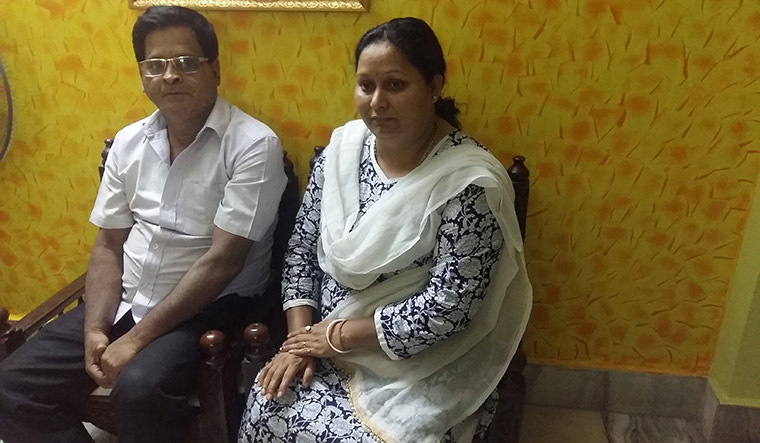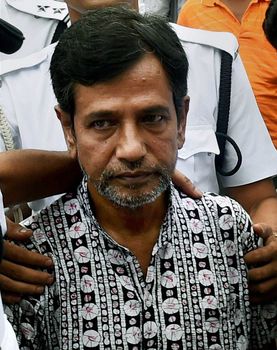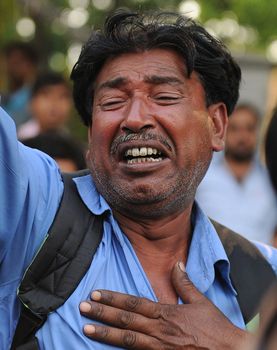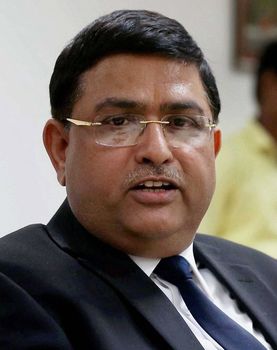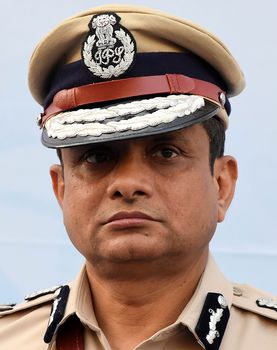Kolkata is tense. As the state and Central governments publicly lock horns over the CBI investigation into the Saradha and Rose Valley chit fund scams, the city’s traders, shoppers, workers and students all have one question: “How badly will the war affect West Bengal?”
Zubin Shah, too, is distraught. A resident of Burrabazar in Kolkata, Shah runs a cosmetics shop in north Kolkata, whose patrons include high-profile politicians in the state. “I called up my children’s school to know whether I should send them there,” he told me as Chief Minister Mamata Banerjee began a sit-in against the CBI’s efforts to question Kolkata Police Commissioner Rajeev Kumar in the Saradha scam case. “Only after they assured me of their security did I send them.”
Zubin was one of the crores of people who voted Mamata Banerjee and her Trinamool Congress to power, ending more than three decades of left rule in the state. He remained a staunch supporter even as Mamata slowly transformed herself from being simple to being expensively simple. She now wears branded saris that look ordinary, carries an iPhone, prefers to stay in five-star hotels and is at ease in the company of tycoons.
But it was not Mamata’s makeover that disillusioned Zubin. It was the sight of paramilitary forces being deployed to protect Central government offices in Kolkata and elsewhere, as Trinamool workers hit the street in protest. Roads were blocked, public transport went haywire, and the police struggled to maintain law and order. All this mayhem, Zubin said, to shield a powerful police officer who was accused of tampering with evidence related to the Saradha case.
A few kilometres from Zubin’s shop, in the eastern part of the city, lives a former police officer who says he paid dearly for refusing to do the commissioner’s bidding—which was to unlawfully obtain files related to the Saradha case. Anjan Chakraborty, 67, a Meghalaya Police officer who was on deputation to the CBI in Kolkata from 2001 to 2008, says Rajeev Kumar asked him to help the police trap CBI officers who were investigating the case. Chakraborty, at that time, had voluntarily retired from the CBI and was a contract employee at the cyber cell in the Kolkata Police headquarters at Lalbazar.
“The Kolkata police commissioner told me (in 2017) that he would give me big money to trap one CBI officer,” Chakraborty told THE WEEK. “Officers of STF (Kolkata Police’s special task force, which inquired into the Saradha scam) were asked to coordinate with me. They told me that I would simply have to call the [CBI] officers and give them money, and that the police would be waiting nearby with photographers and necessary security.”
Chakraborty was told to trap the officers on July 14, 2017. An upright officer with an impeccable record, he refused to do so. “I was tortured for that,” he said. “They booked me on false charges. But, even after more than a year, I have not been charge-sheeted.”
The Kolkata Police arrested Chakraborty from Shillong on August 4, 2017, on charges of having swindled Rs2.5 lakh from a businessman. The complaint against him was registered five days after he reportedly refused to trap the CBI officer. According to the first information report, the businessman whom Chakraborty cheated is Abdul Munaf from Ekbalpore. His whereabouts, however, are not known now.
Chakraborty says he had left Kolkata to avoid being harassed by the police. In an effort to find him, the police raided his home and allegedly harassed his wife, Jhunjhun, and daughter Ankita, 14. “I still shiver when I think about it,” said Jhunjhun. “They made obscene remarks against me and my daughter. She is still being treated by a psychiatrist.”
Chakraborty said the police prepared a false seizure report after he was arrested, and paraded him before the media in Shillong. Back in Kolkata, he spent around 40 days in police custody, before the court released him on October 17 citing absence of evidence.
By then, he was “demoralised and mentally demolished” and his hard-earned reputation as a capable and committed officer was in tatters. “We have no idea what he did,” T.R. Marak, a senior officer of the Meghalaya Police’s enforcement department, told THE WEEK. “He was an exemplary officer of our force.”
Chakraborty had led several successful operations against militants in Meghalaya before he was sent on deputation to the CBI in 2001. A major factor behind his deputation was the grave security threat against him. On August 17, 2006, Meghalaya director-general of police W.R. Marbaniang wrote to CBI director Vijay Shankar that “there was no objection to [Chakraborty’s] absorption to the CBI”. Marbaniang said the security threat against Chakraborty persisted “because of his outstanding performance against the militants in Meghalaya”.
A man of action, Chakraborty did not find his brief at CBI to be appealing. He returned to Meghalaya as deputy superintendent of police in 2008, and retired voluntarily six years later.
In 2015, he started working with Dilip Ghosh, who was appointed president of the BJP’s West Bengal unit that year. Chakraborty said he helped Ghosh deal with matters related to law. In March 2017, he said he met Rajeev Kumar, who had been appointed Kolkata Police commissioner the previous year. Kumar was head of the special investigation team that probed the cases related to Saradha and Rose Valley chit fund scams (see graphics on page 37).
Apparently impressed by Chakraborty’s credentials, Kumar asked him to work on contract at the cyber cell. Chakraborty said he was not given any responsibilities, and that he was paid Rs8,000 after the first month. The department later said they could not pay him, saying the government had not sanctioned the money.
Chakraborty then met Kumar again. It was during that meeting, he said, that the commissioner asked him to trap CBI officers. “The special task force officers later asked me to obtain important documents from the CBI office in Kolkata,” he said. “They told me I would be paid very well for the assignment. They all wanted to malign the CBI and put an end to the Saradha investigation.”
On October 22, 2017, barely a week after the court released Chakraborty from police custody, Rakesh Asthana was appointed CBI special director. Early last year, Asthana visited the CBI zonal office in Kolkata and reportedly inquired about the alleged efforts of the Kolkata Police commissioner to scuttle the investigation into the scam.
Former Trinamool MP Kunal Ghosh had told the CBI in 2015 that all evidence in the Saradha case was destroyed by Kumar, who was then Salt Lake commissioner. According to Ghosh, the evidence included details of conversations between Mamata and Sudipta Sen, Saradha chairman and managing director. Interestingly, it was after the scam surfaced that Kumar became Mamata’s trusted lieutenant.
During his visit to Kolkata, Asthana reprimanded the investigators for having gone slow on the Saradha case. In March last year, he played a crucial role in Pankaj Srivastava’s appointment as the CBI’s joint director (east). Srivastava reportedly told CBI director Alok Verma about the involvement of top police officers and politicians in the scam.
The same month, Chakraborty wrote to Asthana about the Kolkata Police’s alleged efforts to trap the investigators. He also wrote to Dipak Mishra, chief justice of India, and his puisne judges, including present CJI Ranjan Gogoi. On March 26, 2018, Srivastava’s office asked Chakraborty to give details about the “complaint lodged by him”.
The CBI soon began summoning all members of the police’s special investigation team that had probed the scam. While most members appeared before the agency, Kumar repeatedly ignored the CBI requests. A former CBI officer in Delhi said that Kumar wrote to Alok Verma last year saying he preferred not to be interrogated by CBI officers in Kolkata, because they were junior to him. (Srivastava is from the 1992 batch, while Kumar belongs to the 1989 batch.)
On January 17, 2018, the CBI hurriedly filled up vacancies in the Kolkata zonal office, with sleuths from Delhi. Apparently, the spurt in staff strength indicates that the agency is inching closer to establishing Mamata’s involvement in the Saradha and Rose Valley cases.
A crucial link is said to be the way Mamata’s paintings were bought by Saradha, Rose Valley and other chit fund firms. The CBI has seized the paintings from the chit fund owners, and has assessed their value with the help of agencies abroad. It has also served notices to Rajya Sabha member Derek O’Brien and Mamata’s close aide Manik Majumdar.
Mamata’s unprecedented moves to protect Rajeev Kumar has only added fuel to the CBI’s fire. Legal experts, too, have come out in support of the agency. “If the allegation is true, then Kumar can be arrested,” said Arunava Ghosh, senior advocate at the Calcutta High Court. “The law does not give any immunity to the commissioner of police.”
Arindam Das, a senior lawyer at the Supreme Court, said the CBI should have acted in a more “mature” manner. “The charge against the commissioner was not that he was part of the looting,” he said. “The charge was that he misused his administrative power. For that, I think, the CBI should have informed the state administration about the charges against him.”
While the state government vigorously shielded Kumar, Chakraborty has been left to fend for himself. Chakraborty says he and his family were so shaken that they took months to recover. On March 14 last year, he lodged a complaint with the National Human Rights Commission, which directed the state unit to look into the matter urgently. On April 9, the West Bengal Human Rights Commission sent a notice to Kumar, asking him to submit a response in four weeks. Kumar is yet to respond; the police case against Chakraborty remains in limbo.
THE WEEK tried to contact both Kumar and Pravin Tripathy, joint commissioner of the special task force, which had arrested Chakraborty in August 2017. They did not respond.
Interestingly, the additional director-general of the Armed Police Headquarters in West Bengal recently sent a memo to Chakraborty. The memo, dated January 19, asked Chakraborty to appear for an interview for recruiting instructors to the CIAT (Counter-Insurgency and Anti-Terrorist) School at Salua.
Chakraborty, who had not applied for the job, attended the interview on February 5. “They were very cordial,” he said. “They asked me how much I would need as salary, and told me that they would inform me about their decision as soon as possible.”
Incidentally, he attended the interview the day the Supreme Court directed Kumar to appear before the CBI in Shillong. Chakraborty sees poetic justice in the court’s decision: It was in Shillong that the Kolkata Police arrested him. “Wait and see,” Chakraborty said. “The commissioner will have to face the consequences of all the sins he has committed.”
The Naxal terroriser
* A 1989-batch IPS officer, Rajeev Kumar was close to, both, former West Bengal chief minister Buddhadeb Bhattacharjee and present Chief Minister Mamata Banerjee
* A graduate from Roorkee College of Engineering, Kumar served as superintendent of police in Birbhum, Burdwan
* He came to Kolkata as deputy inspector general, Criminal Investigation Department (Operations)
* During his time in the CID, he investigated the attack on the American Center building in Kolkata in 2002, and helped the Union government indict Aftab Ansari
* Bhattacharjee made him special task force (STF) chief of Kolkata Police. As STF chief, he used his electronic surveillance skills to crack down on Naxal activities
* He gave important leads to intel agencies about the Pakistani militant groups behind the blasts in Mumbai, Hyderabad and Jaipur, who used the Bangladesh corridor to enter the country
* Sources say he was the brains behind the 2009 capture of Naxal leader Chhatradhar Mahato from Lalgarh
* In 2011, Kumar helped central security forces track Maoist military commission chief Kishenji, who was killed in the encounter
* When the Biddhannagar Police Commiserate was formed in 2012, Kumar was appointed its first commissioner
* In 2013, he took over the investigation of the Saradha case as chief of the special investigation team, but was accused by opposition parties of stalling the probe
* He gave inputs to the NIA to crush the Jamaat-ul-Mujahideen Bangladesh module in Bengal after the 2014 Burdwan blast
* He was appointed Kolkata commissioner in 2016
* Kumar is known as an expert in investigating counterfeit currency cases



